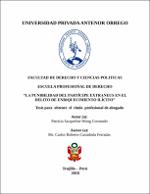Mostrar el registro sencillo del ítem
La punibilidad del partícipe extraneus en el delito de enriquecimiento ilícito
| dc.contributor.advisor | Castañeda Ferradas, Carlos Roberto | |
| dc.contributor.author | Wong Coronado, Patricia Jacqueline | |
| dc.creator | Wong Coronado, Patricia Jacqueline | |
| dc.date.accessioned | 2018-04-17T14:57:13Z | |
| dc.date.available | 2018-04-17T14:57:13Z | |
| dc.date.issued | 2018 | |
| dc.identifier.uri | https://hdl.handle.net/20.500.12759/4043 | |
| dc.description.abstract | La presente tesis tiene por finalidad sustentar la punibilidad del partícipe extraneus en el delito de enriquecimiento ilícito, considerando la incomunicabilidad de circunstancias y cualidades personales entre autores y partícipes. El primer capítulo de este trabajo de investigación comprende el problema, hipótesis, objetivos y justificación de la presente tesis. El segundo capítulo aborda el marco teórico, que incluye los antecedentes y las bases teóricas; la misma que consta, a su vez, de seis acápites. El primer acápite comprende temas referentes al delito como tal. El segundo acápite refiere sobre los sujetos intervinientes en el delito, basándose en las formas de intervención delictiva, como son la autoría y la participación. Asimismo, se incluyen los conceptos de extraneus e intraneus. El tercer acápite comprende conceptos relacionados al delito de enriquecimiento ilícito. El cuarto acápite estudia el Principio de Accesoriedad Delictiva y los principios que se vinculan a este. El quinto acápite refiere sobre el Principio de Incomunicabilidad de circunstancias y cualidades entre autores y partícipes de un mismo hecho delictivo. El sexto acápite se centra en las circunstancias y cualidades personales del autor que afectan o fundamentan la responsabilidad penal del partícipe extraneus. El tercer capítulo aborda la metodología seguida en el presente trabajo investigativo. Finalmente el quinto capítulo comprende las conclusiones arribadas en este estudio, habiéndose logrado determinar que es posible sustentar la punibilidad del partícipe extraneus en el delito de enriquecimiento ilícito, teniendo en cuenta la incomunicabilidad de circunstancias y cualidades personales entre autores y partícipes prevista en el artículo N° 26 del Código Penal, partiendo de su estudio e interpretación; considerando que este artículo solo comprendería la incomunicabilidad de circunstancias y cualidades que afecten la responsabilidad de autores a partícipes de un mismo hecho delictivo, es decir, de aquellas que atenúen, agraven o excluyan la responsabilidad penal, siendo que al no estar inmersas, dentro de este precepto legal, las circunstancias y cualidades que fundamentan la responsabilidad penal, estas sí podrían ser comunicables de autores a partícipes de un mismo hecho punible. | es_PE |
| dc.description.abstract | The purpose of this thesis is to support the punishability of the extraneus participant in the crime of illicit enrichment, considering the incommunicability of circumstances and personal qualities between authors and participants. The first chapter of this research work includes the problem, hypothesis, objectives and justification of the present thesis. The second chapter deals with the theoretical framework, which includes the background and the theoretical bases; the same that consists, in turn, of six sections. The first section includes issues related to crime as such. The second section refers to the subjects involved in the crime, based on the forms of criminal intervention, such as authorship and participation. Likewise, the concepts of extraneus and intraneus are included. The third section includes concepts related to the crime of illicit enrichment. The fourth section studies the Criminal Accessibility Principle and the principles that are linked to it. The fifth section refers to the Principle of Incomunicability of circumstances and qualities between authors and participants in the same criminal act. The sixth section focuses on the circumstances and personal qualities of the author that affect or support the criminal liability of the extraneus participant. The third chapter addresses the methodology followed in the present research work. Finally, the fifth chapter includes the conclusions arrived at in this study, having been able to determine that it is possible to sustain the punishability of the extraneus participant in the crime of illicit enrichment, taking into account the incommunicability of circumstances and personal qualities between authors and participants provided in article N ° 26 of the Criminal Code, based on its study and interpretation; Considering that this article would only understand the incommunicability of circumstances and qualities that affect the responsibility of authors to participate in the same criminal act, that is to say, those that attenuate, aggravate or exclude criminal responsibility, being that not being immersed, within This legal precept, the circumstances and qualities that underlie criminal responsibility, these could be communicable from authors to participants in the same punishable act. | en_US |
| dc.description.uri | Tesis | es_PE |
| dc.format | application/pdf | es_PE |
| dc.language.iso | spa | es_PE |
| dc.publisher | Universidad Privada Antenor Orrego | es_PE |
| dc.relation.ispartofseries | T_DERE_396 | |
| dc.rights | info:eu-repo/semantics/openAccess | es_PE |
| dc.rights.uri | https://creativecommons.org/licenses/by/4.0/ | es_PE |
| dc.source | Universidad Privada Antenor Orrego | es_PE |
| dc.source | Repositorio Institucional - UPAO | es_PE |
| dc.subject | Punibilidad | es_PE |
| dc.subject | Extraneus | es_PE |
| dc.title | La punibilidad del partícipe extraneus en el delito de enriquecimiento ilícito | es_PE |
| dc.type | info:eu-repo/semantics/bachelorThesis | es_PE |
| thesis.degree.level | Título Profesional | es_PE |
| thesis.degree.grantor | Universidad Privada Antenor Orrego. Facultad de Derecho y Ciencias Politicas | es_PE |
| thesis.degree.name | Abogado | es_PE |
| thesis.degree.discipline | Derecho | es_PE |
| dc.subject.ocde | https://purl.org/pe-repo/ocde/ford#5.05.00 | es_PE |
| renati.type | https://purl.org/pe-repo/renati/type#tesis | es_PE |
| renati.level | https://purl.org/pe-repo/renati/level#tituloProfesional | es_PE |
| renati.discipline | 421016 | es_PE |
| dc.publisher.country | PE | es_PE |
Ficheros en el ítem
Este ítem aparece en la(s) siguiente(s) colección(es)
-
Derecho [477]


